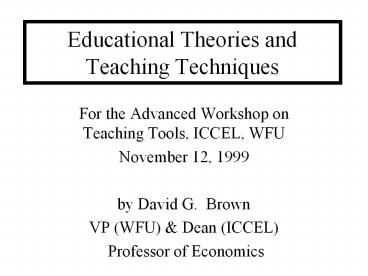Educational%20Theories%20and%20Teaching%20Techniques - PowerPoint PPT Presentation
Title:
Educational%20Theories%20and%20Teaching%20Techniques
Description:
Educational Theories and Teaching Techniques For the Advanced Workshop on Teaching Tools, ICCEL, WFU November 12, 1999 by David G. Brown VP (WFU) & Dean (ICCEL) – PowerPoint PPT presentation
Number of Views:283
Avg rating:3.0/5.0
Title: Educational%20Theories%20and%20Teaching%20Techniques
1
Educational Theories and Teaching Techniques
- For the Advanced Workshop on Teaching Tools,
ICCEL, WFU - November 12, 1999
- by David G. Brown
- VP (WFU) Dean (ICCEL)
- Professor of Economics
2
Flow of the Day
Exposure to New Tools
Putting it All Together
Choice of --activities --tools --setting
Philosophy re --Objectives --Means --Subject
Matter
3
Steps toward Redesign
- Recognize that you are redesigning a course, not
learning technology for its own sake. - Identify beliefs and objectives.
- Learn about the tools and techniques available.
- Match activities and settings.
- Implement!
What Tools are available?
What do you want to do?
Redesign Your Course!
ICCEL -- Wake Forest University, 1999
4
What Works for You?6 Ways to tease out your
answer
- Types of assignments and/or lectures that seem to
be most effective? Want to give your student
more of what? - Your philosophy of teaching?
- Idea behind your course?
- Metaphors for your role?
- 3 Most Important Principles of Good Teaching?
- Diagram?
ICCEL -- Wake Forest University, 1999
5
Principles of Good Teachingplus an 8th
- Encourage contact between students and faculty
- Develop cooperation among students
- Encourage active learning
- Give prompt feedback
- Emphasize time on task
- Communicate high expectations
- Respect diverse talents and ways of thinking
- Utilize a full range of learning materials
ICCEL -- Wake Forest University, 1999
6
Metaphors for Professors Role
- Coach and team
- Master and apprentices
- Sage on the Stage
- Guide by the Side
- Fountain of Information
- Salesperson
- ___________________
ICCEL -- Wake Forest University, 1999
7
Student Knowledge
A
P
S
A
P
S
A
P
S
Time
ICCEL -- Wake Forest University, 1999
8
Diagrams of a Course
Test
ICCEL -- Wake Forest University, 1999
9
Beliefs of 91/93 Vignette AuthorsPedagogy and
Philosophy
From Interactive Learning Forthcoming Nov.,
1999 From Anker Publishing David G. Brown, Editor
- Interactive Learning
- Learn by Doing
- Collaborative Learning
- Integration of Theory and Practice
- Communication
- Visualization
- Different Strokes for Different Folks
ICCEL -- Wake Forest University, 1999
10
Typology of Tools Techniques
- For Increased Communication (8)
- For Interactive Learning (5)
- For Customization (4)
- For New Materials and
Presentation Modes (9) - For Electronic Course Management (5)
From Interactive Learning, Anker Publishing, 1999
(forthcoming)
ICCEL -- Wake Forest University, 1999
11
For Increased Communication
- Web Pages for Course Materials
- Email Group and Individual
- Asynchronous Discussion Groups
- Hyperlinks to Related Materials
- More Time for Class Discussion
- Synchronous Chatrooms
- Office Hours on Line
- Consultants Experts in Discussion
ICCEL -- Wake Forest University, 1999
12
For Interactive Learning
- Simulations
- Team Projects
- Student Web Pages
- Student Publishing on the Web
- Collaborative Teaching
ICCEL -- Wake Forest University, 1999
13
For Customization
- Self-Paced Exercises
- Virtual Courses (internet only)
- Self-Paced Lectures
- Self-Paced Quizzes
ICCEL -- Wake Forest University, 1999
14
For New Materials Modes
- Citations to the Web (URLs)
- PowerPoint Multimedia Presentations
- Lecture Notes on Line
- Computer Skill Exercises
- Cross-Cultural Analyses
- Electronic Textbook
- Cybershows
- Custom CD-Rom
- Archive of Images
ICCEL -- Wake Forest University, 1999
15
For Electronic Course Management
- Course Shell
- Group Email
- Electronic Gradebook
- Dynamic Syllabus
- On line grading
ICCEL -- Wake Forest University, 1999
16
(No Transcript)
17
David G. BrownWake Forest UniversityWinston-Sale
m, N.C. 27109336-758-4878email
brown_at_wfu.eduhttp//www.wfu.edu/brownfax
336-758-4875































